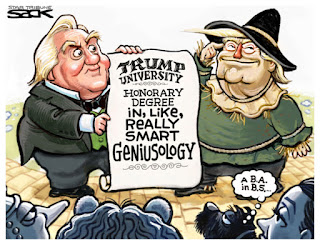Trolling Trump
Yes, trolling is bad, but I'm just giving Trump a taste of his own medicine. If I get points taken off, so be it (though I think Starace just doesn't want us trolling each other).

Right off the bat, Donald makes an error. Saying "We, the citizens of America, are now joined in a great national effort to rebuild our country and to restore its promise for all of our people". This statement is as vague as answering a yes or no question with "okay". Rebuild? Rebuild how? Is our country lacking buildings? Roads? Rebuild what? He also doesn't specify what promise he is referring to.
Actually, the whole speech is filled with the vague political language Orwell paints in a negative light. Examples of this include "We will face challenges. We will confront hardships. But we will get the job done" and "The forgotten men and women of our country will be forgotten no longer". He doesn't specify anything, and dances around legitimate plans for the future with promises of vague improvement for the country, not even specifying those he plans on helping. Who are the "forgotten people" of America?
 Orwell says there are main four questions a writer should ask themselves when finishing a letter, a book, or, you know, a speech that the entire country is going to hear. Trump did not ask himself these questions.
Orwell says there are main four questions a writer should ask themselves when finishing a letter, a book, or, you know, a speech that the entire country is going to hear. Trump did not ask himself these questions.
The first of these is "What am I trying to say?". I'm not entirely sure what the overall message of this inaugural address was. To accept his position as president gratefully, absolutely, but there was no promise of what would get done during his presidency. "Returning power to the people" goes back to the vagueness issue, and in expressing this point, he was not concise. Rather, he seemed to repeat the same sentence a couple different ways, which goes back to the forgotten people again.
One (the quote mentioned previously): "The forgotten men and women of our country will be forgotten no longer. Everyone is listening to you now".
Two: "So to all Americans, in every city near and far, small and large, from mountain to mountain, and from ocean to ocean, hear these words:
You will never be ignored again".
The message may have been clear, but it was not specific and violated the next question "What words will express it?". Donald's speech was too drawn out, and not specific enough to prove a point effectively.
The next two questions, "What image or idiom will make it clearer?" and "Is this image fresh enough to have an effect?" were not often relevant to this particular address because Mr. Trump did not use much imagery to support whatever he was trying to say.
When he did, though, he used phrases and language that have been used by politicians in the past. Example: "But for too many of our citizens, a different reality exists: Mothers and children trapped in poverty in our inner cities; rusted-out factories scattered like tombstones across the landscape of our nation; an education system, flush with cash, but which leaves our young and beautiful students deprived of knowledge...". The tombstone analogy is not original, relating the death of something (industry, in this case) to a tombstone is pretty basic. The other attempts at imagery were not clear enough to help his case.
Moving to later in the article, Orwell says "The great enemy of clear language is insincerity". The simplicity of the words and phrases and promises Trump made in the speech seemed insincere, clarifying Orwell's point. He was saying that politicians, and people in general, tend to fall back on basic words or phrases that are muddy and unclear when they do not actually mean what they are saying. The language in the address made Trump seem detached from the people, for he was making promises many politicians have made before in a similar manner.
In conclusion, Donald Trump did not escape the the flaws of the evolution of the English language that George Orwell mentions in his article, rather commits quite a few of these word crimes (yes that was a Weird Al reference). Mr. Trump proved the point that "in our time it is broadly true that political writing is bad writing". Following this sentence, Orwell talks about how when political speeches can qualify as good writing, it is often when the person speaking has original ideas that they are passionate about. In short, they are genuine.
It is absolutely true that my hatred of Trump and his policies made me demonize his writing, so aside from the fact that it is bad, I may have made his inaugural address seem worse than it is. But you are welcome to decide for yourself:
https://www.whitehouse.gov/briefings-statements/the-inaugural-address/
(PS I'm not sure why some of the words are highlighted I tried to fix it and did not succeed.)
This is an analysis of Trump's inaugural address using George Orwell's essay "Politics and the English Language".

Right off the bat, Donald makes an error. Saying "We, the citizens of America, are now joined in a great national effort to rebuild our country and to restore its promise for all of our people". This statement is as vague as answering a yes or no question with "okay". Rebuild? Rebuild how? Is our country lacking buildings? Roads? Rebuild what? He also doesn't specify what promise he is referring to.
Actually, the whole speech is filled with the vague political language Orwell paints in a negative light. Examples of this include "We will face challenges. We will confront hardships. But we will get the job done" and "The forgotten men and women of our country will be forgotten no longer". He doesn't specify anything, and dances around legitimate plans for the future with promises of vague improvement for the country, not even specifying those he plans on helping. Who are the "forgotten people" of America?
 Orwell says there are main four questions a writer should ask themselves when finishing a letter, a book, or, you know, a speech that the entire country is going to hear. Trump did not ask himself these questions.
Orwell says there are main four questions a writer should ask themselves when finishing a letter, a book, or, you know, a speech that the entire country is going to hear. Trump did not ask himself these questions.The first of these is "What am I trying to say?". I'm not entirely sure what the overall message of this inaugural address was. To accept his position as president gratefully, absolutely, but there was no promise of what would get done during his presidency. "Returning power to the people" goes back to the vagueness issue, and in expressing this point, he was not concise. Rather, he seemed to repeat the same sentence a couple different ways, which goes back to the forgotten people again.
One (the quote mentioned previously): "The forgotten men and women of our country will be forgotten no longer. Everyone is listening to you now".
Two: "So to all Americans, in every city near and far, small and large, from mountain to mountain, and from ocean to ocean, hear these words:
You will never be ignored again".
The message may have been clear, but it was not specific and violated the next question "What words will express it?". Donald's speech was too drawn out, and not specific enough to prove a point effectively.
The next two questions, "What image or idiom will make it clearer?" and "Is this image fresh enough to have an effect?" were not often relevant to this particular address because Mr. Trump did not use much imagery to support whatever he was trying to say.
When he did, though, he used phrases and language that have been used by politicians in the past. Example: "But for too many of our citizens, a different reality exists: Mothers and children trapped in poverty in our inner cities; rusted-out factories scattered like tombstones across the landscape of our nation; an education system, flush with cash, but which leaves our young and beautiful students deprived of knowledge...". The tombstone analogy is not original, relating the death of something (industry, in this case) to a tombstone is pretty basic. The other attempts at imagery were not clear enough to help his case.
Moving to later in the article, Orwell says "The great enemy of clear language is insincerity". The simplicity of the words and phrases and promises Trump made in the speech seemed insincere, clarifying Orwell's point. He was saying that politicians, and people in general, tend to fall back on basic words or phrases that are muddy and unclear when they do not actually mean what they are saying. The language in the address made Trump seem detached from the people, for he was making promises many politicians have made before in a similar manner.
In conclusion, Donald Trump did not escape the the flaws of the evolution of the English language that George Orwell mentions in his article, rather commits quite a few of these word crimes (yes that was a Weird Al reference). Mr. Trump proved the point that "in our time it is broadly true that political writing is bad writing". Following this sentence, Orwell talks about how when political speeches can qualify as good writing, it is often when the person speaking has original ideas that they are passionate about. In short, they are genuine.
It is absolutely true that my hatred of Trump and his policies made me demonize his writing, so aside from the fact that it is bad, I may have made his inaugural address seem worse than it is. But you are welcome to decide for yourself:
https://www.whitehouse.gov/briefings-statements/the-inaugural-address/
(PS I'm not sure why some of the words are highlighted I tried to fix it and did not succeed.)



It is pretty undeniable that Donald Trump's speeches if read without him saying them are just unequivocal nonsense. But part of what I find interesting, is that many of his speeches aren't actually works of writing, they're works of speaking if you will, and can only be understood in that context. When Trump says words, you have to feel the emotions he's feeling in the moment to understand what he's struggling so desperately to say. What he says might not make sense to you, but that's because you're a liberal. You don't want to feel like Trump, so you can't make sense of what he says. When a supporter hears him say something like "rebuild the country" do you know what they hear? Well neither do I, but chances are, it's exactly what they want to hear. And you might say, "well that's exactly the point of vague political writing," but the difference is... um... wait. I'll have to get back to you on that one.
ReplyDelete